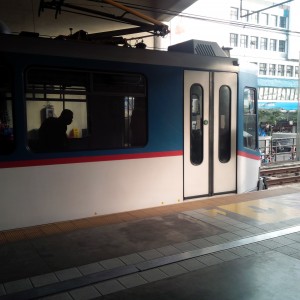MANILA, Philippines—While a high-speed railway remains but a dream, some measure of relief for hundreds of thousands of commuters using the crammed Metro Rail Transit Line 3 (MRT-3) may be forthcoming with the launching of what the government is billing as an “express train service” starting Wednesday.
The Department of Transportation and Communications (DOTC) said in a statement Tuesday that the MRT-3 express service would be implemented during peak hours and would serve specific stations to bring passengers directly between Quezon City and Makati City and Pasay City.
The experimental service on a trial run through May 20 will complement regular train operations in the morning and late afternoon rush hours, the DOTC said.
“MRT-3 management will evaluate the results of the experiment and make its recommendation to the DOTC on whether the express train service should be made permanent,” the statement said.
The scheme, which follows the implementation of longer operating hours, was aimed at easing congestion at the elevated railway line that serves over half a million passengers daily, above MRT-3’s design capacity of 350,000 passengers per day.
Long-term solutions, like the acquisition of more train cars from Chinese manufacturer Dalian Locomotive & Rolling Stock Co., would not be felt by commuters until the second half of 2015.
“We hope that this trial run will yield positive results for passengers. Ideally, it will increase mobility—meaning it will get commuters from their origins to their destinations more quickly—as well as lessen waiting time at our most congested stations during peak hours,” Transportation Secretary Joseph Abaya said.
Attuned to riding habits
The DOTC based the plan on historical passenger volume data. It noted that most peak-hour weekday morning riders begin their trips at North Avenue station.
A substantial number also start from Quezon Avenue, GMA-Kamuning and Cubao stations with Buendia, Ayala, Magallanes and Taft Avenue stations as destinations.
Meanwhile, most peak-hour weekday afternoon riders start their trips from Taft Avenue station, with a large number also boarding from Magallanes, Ayala and Buendia stations. Most of these passengers then alight at Cubao, GMA-Kamuning, Quezon Avenue and North Avenue stations.
“The experimental scheme is meant to cater to these passenger riding habits, by the deployment of express trains that will skip other stations and go directly to the ones with most activity,” the DOTC said.
From May 7 to 13, southbound express trains will be deployed alternately with regular trains from North Avenue station from 7 a.m. to 9 a.m. From May 14 to 20, the same experimental morning schedule will be implemented, with the addition of northbound express trains running alternately with regular trains from Taft Avenue station from 5 p.m.-7 p.m.
5 stops from end-stations
All express trains will make only five stops from the time they are deployed from the end-stations.
The first or “pick-up” stop is meant to board passengers from one of the more heavily congested stations, before going directly to the second to fifth stops, where most riders will alight. This means that the morning and afternoon trips will each ply three different routes to maximize the experiment’s impact on riders.
For the morning runs beginning at North Avenue station, the first express train will make a pick-up stop at Quezon Avenue station, the second at GMA-Kamuning station, and the third at Cubao station.
Each one will then proceed to Buendia, Ayala, Magallanes and Taft Avenue stations. This cycle will be repeated alternately with regular trains during the 7 a.m.-9 a.m. peak hours.
For the afternoon runs beginning at Taft Avenue station, the first express train will make a pick-up stop at Magallanes station, the second from Ayala station, and the third from Buendia station.
Each one will then proceed to Cubao, GMA-Kamuning, Quezon Avenue and North Avenue stations. This cycle will be repeated alternately with regular trains during the 5 p.m.-7 p.m. peak hours.
The DOTC has tasked the MRT-3 management to install sufficient notices to inform passengers of the test runs. MRT-3 will also make announcements over the public address systems of its stations to update passengers regarding each approaching train—whether it is a regular train or an express train.
RELATED STORIES
MRT operating hours extension still in testing phase


